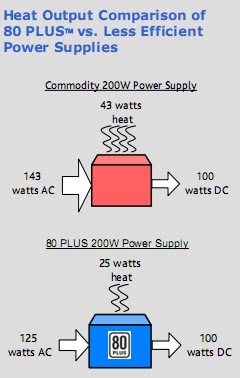80 Plus Power Supply Units

Saving energy is already a critical task in many parts of the world, and started to become a issue even in countries that did not have this on a high priority.
Computer systems are demanding more power than ever before, and this can largely be attributed to better, more powerful, hardware. This includes video cards and processors, but also other components such as sound cards, hard drives, or displays are more demanding. All of these components may raise the power needs of the computer, and thus also the power consumption.
Companies began to research and produce energy efficient PC components that reduce the power consumption of a computer system without reducing its processing power. One of this programs is the 80 Plus initiative for power supply units. The power supply unit (or psu) is basically the unit that distributes the power to the various PC components by converting AC power from electric utilities to DC power.
Standard power supply units lose a lot of energy in that process while efficient ones lose considerably less. The 80 Plus initiative now certifies power supply units with a energy efficiency of 80% or more and a true power factor of 0.9 and more. This means that these power supply units need less energy to supply the computer system with the same power.
A desktop PC using an 80 Plus power supply will use 85 Kwh less per year than one with an average power supply unit. But this is not the only benefit. Those systems produce less heat which may result in noise level reduction, and reduced cooling requirements or costs. It also means that the PC components will usually last longer.
Not all power supply unit manufacturers are part of the 80 Plus initiative and it is possible to purchase efficient power supply units without the 80 Plus logo. The main benefit for the consumer is the immediate recognition that the psu is energy efficient. Someone would have to research the energy efficiency of a psu that is not included the program, which could take a while and might even lead to no results.
80 Plus power supply units do not seem to cost more money than those without the logo which is why it is probably a good idea to pick one of those instead of regular ones on the next purchase. It should also be noted that there are actually sox logos for 80 Plus power supply units which are standard, bronze, silver, gold, platinum and titanium.
Here is a quick overview of the efficiency (115V internal non-redundant 80 Plus test type). Source is Wikipedia.
- 80 Plus -- 80%
- 80 Plus Bronze -- 82%
- 80 Plus Silver -- 85%
- 80 Plus Gold -- 87%
- 80 Plus Platinum -- 89%
- 80 Plus Titanium -- 90%
These values differ depending on the test type. For the 230V EU internal non-redundant 80 Plus test type, they are the following:
- 80 Plus -- 82%
- 80 Plus Bronze -- 85%
- 80 Plus Silver -- 87%
- 80 Plus Gold -- 89%
- 80 Plus Platinum -- 90%
- 80 Plus Titanium -- 94%
Additionally, for the higher certification levels, the 0.9% power factor was extended to apply 20% and 50% load situations as well. The Platinum certification level requires at least a 0.95 or better power factor.
Here’s a good reference:
Common Errors in English
http://www.wsu.edu/~brians/errors/errors.html#errors
Martin – Too many people on the net make the common mistake of using the word “loose” when they should use “lose” which you did in this article.
“Standard power supply units loose a lot of energy in that process while efficient ones loose considerably less.”
should be:
“Standard power supply units lose a lot of energy in that process while efficient ones lose considerably less.
I think I looked it up about 100 times in the past 10 years and I always forget it again..